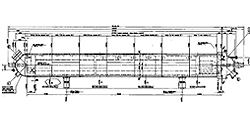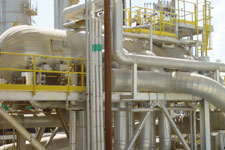


Fitness-For-ServiceIn most chemical plant sites there are times when it is necessary to carry out specific fitness-for-service assessments to demonstrate mechanical integrity of some equipment items until the next scheduled inspection. This is necessary when significant deteriorations are found or if they are expected to initiate. The staff at PP SIMTECH have specialist hands-on knowledge incorporating more than 25 years of integrated experience in the application of fitness-for-service assessment techniques for this purpose. Additionally we have successfully used this technology to justify extension of current inspection interval for some items; to justify extension of equipment life; to justify change of duty as well as to complement the RBI Assurance process.
Types of equipment items where we have carried out these fitness-for-service assessments include reactors, distillation columns, chemical storage spheres, reformer components, superheater headers, other types of pressure vessels, various storage tanks and piping, which have been subjected to a variety of thinning damage mechanisms involving localized and general wastage. Capability of PP SIMTECH in reliably matching plant users needs is demonstrated by illustration of two case study examples.
|
|


